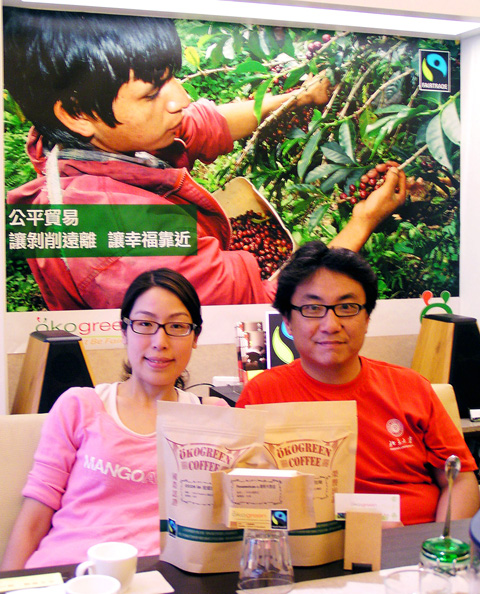The nation's first fair trade shop licensed by the Fairtrade Labeling Organization (FLO) International, headquartered in Germany, opened in Taipei recently, enabling consumers to buy products made in developing countries while helping them benefit through trade.
Oko Green, established and run by Hsu Wen-yen (徐文彥), is a cozy little coffee shop nestled in a quiet lane off of Xuzhou Road, and offers coffee beans — both via the Internet or at his shop — along with freshly made coffee.
There is no price list for Hsu’s coffee.

PHOTO: CNA
“You pay what you consider a reasonable price, “ said Hsu, who spent more than a year obtaining an FLO license to operate an FLO fairtrade shop.
Hsu obtained his FLO license in December and four months later opened his shop, where he sells beans from Africa, Latin America and other developing countries at much lower prices than those sold at supermarkets or international food chains.
Oko Green’s coffee beans are directly supplied by FLO International at prices that include no middle-man costs.
Hsu maintains a transparent cost-and-spending chart that can be monitored directly by FLO International headquarters on a daily basis.
Under the FLO motto of Trade Not Aid, Hsu follows FLO criteria by donating 1 percent of his business turnover each month to support FLO activities aimed at helping people in poor developing countries, including building power plants, exploring new water sources, developing medical infrastructure and helping people to escape poverty.
Hsu himself donates NT$10 for each cup of coffee sold at his shop to local charity organizations “to help people from my own country to save energy and cut carbon dioxide emissions.”
Hsu became aware of fair trade operations several years ago, but knew that Taiwanese had been purchasing FLO-certified products from Japan at “unreasonably high prices” because of a lack of any FLO representation here.
He wanted to establish an FLO-certified shop in Taiwan and started to contact the head office in 2006, only to find that the road before him was “long and winding.”
After a lot of difficulty, he received a FLO business license on Dec. 7 last year, issued by the head office after it found that Hsu was a member of Taiwan’s Green Party with a strong commitment to environmental protection and wildlife conservation efforts, Hsu said.
Fair trade certification is a product certification system designed to allow people to identify products that meet agreed environmental, labor and development standards.
With oversight by a standard-setting body, FLO International, and a certification body, FLO-CERT, the system involves independent auditing of producers to ensure the agreed standards are met. Companies offering products that meet the fair trade standards may apply for licenses to use the fairtrade certification mark for those products.
The FLO international fair trade certification system covers a growing range of products, including bananas, honey, oranges, cocoa, coffee, cotton, oil seeds, quinoa, rice, spices, sugar, tea and wine, as well as handicraft products.
As of last December, 632 producer organizations in 58 developing countries were FLO-CERT fair-trade-certified.
The fair trade movement is now active in 14 countries and there are 287 fair trade towns in Europe alone. Japan was the first Asian country where FLO fair trade activities have become popular.

A strong continental cold air mass is to bring pollutants to Taiwan from tomorrow, the Ministry of Environment said today, as it issued an “orange” air quality alert for most of the country. All of Taiwan except for Hualien and Taitung counties is to be under an “orange” air quality alert tomorrow, indicating air quality that is unhealthy for sensitive groups. In China, areas from Shandong to Shanghai have been enveloped in haze since Saturday, the ministry said in a news release. Yesterday, hourly concentrations of PM2.5 in these areas ranged from 65 to 160 micrograms per cubic meter (mg/m³), and pollutants were

Taiwan’s armed forces have established response protocols for a wide range of sudden contingencies, including the “Wan Chun Plan” to protect the head of state, the Ministry of Defense (MND) said today. After US President Donald Trump on Saturday launched a series of airstrikes in Venezuela and kidnapped Venezuelan President Nicolas Maduro, concerns have been raised as to whether China would launch a similar “decapitation strike” on Taiwan. The armed forces regularly coordinate with relevant agencies and practice drills to ensure preparedness for a wide range of scenarios, Vice Minister of National Defense Hsu Szu-chien (徐斯儉) told reporters before a

EVA Airways on Saturday said that it had suspended a pilot and opened an investigation after he allegedly lost his temper and punched the first officer several times as their plane was taxiing before takeoff at Los Angeles International Airport. According to a report published on Thursday by The Reporter, the incident occurred after the flight’s Malaysian first officer tried to warn the Taiwanese pilot, surnamed Wen (文), that he was taxiing faster than the speed limit of 30 knots (55.6kph). After alerting the pilot several times without response, the first officer manually applied the brakes in accordance with standard operating

NOT AN OPENING: Trump’s violation of international law does not affect China’s consideration in attacking Taiwan; Beijing lacks capability, not precedent, an official said Taiwanese officials see the US’ capture of the president of Venezuela as a powerful deterrent to Beijing’s aggression and a timely reminder of the US’ ability to defeat militaries equipped with Chinese-made weapons. The strikes that toppled Venezuelan President Nicolas Maduro signaled to authoritarian leaders, including Chinese President Xi Jinping (習近平), US President Donald Trump’s willingness to use military might for international affairs core to US interests, one senior official in Taipei’s security circle said. That reassured Taiwan, the person said. Taipei has also dismissed the idea that Trump’s apparent violation of international law could embolden Beijing, said the official, who was not